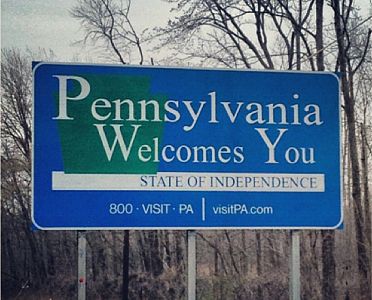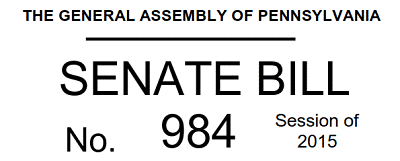
Photo: Pennsylvania! #roadtrip by Jeff Robbins is licensed under CC BY
In November 2016, Pennsylvania recently passed a bill to regulate ride-hailing companies. The ‘rideshare’ law sets insurance standards, fee and licensing requirements for the companies, and inspection standards for the drivers. The law includes new taxes for airport pickups and for rides originating in Philadelphia.
More importantly, the law doesn’t require fingerprints to be part of the driver background check. Uber and Lyft lobbied successfully against this. They fight the fingerprinting requirement because it would add costs and slow down the hiring process.
Pennsylvania drivers need to obtain a ‘rideshare’ car insurance policy
No more using personal auto insurance, and “forgetting” to tell the carrier that you are driving people around town for money. Drivers need to carry insurance that recognizes that they drive for Uber, Lyft or another transportation network company (TNC). See more on this insurance requirement.
This ultimately protects drivers from themselves, forcing them to get a hybrid, ‘rideshare’ policy. If they didn’t have this policy and reported an accident to their personal insurance company, that company would most likely drop them.
 According to the new law, insurance coverage from the TNC kicks in as soon as the app is turned on. While logged into the network, drivers, or the driver’s TNC on their behalf, must carry primary automobile liability insurance of at least
According to the new law, insurance coverage from the TNC kicks in as soon as the app is turned on. While logged into the network, drivers, or the driver’s TNC on their behalf, must carry primary automobile liability insurance of at least
- 50,000 for death and injury per person;
- $100,000 death and injury per incident and
- $25,000 for property damage.
This is pretty basic coverage. The important thing to note is that it’s primary coverage. Under the old system, when a driver was logged onto the app, but without a ride, Uber and the other TNCs would offer secondary coverage. Uber would make the driver send it through their personal insurance company, which would drop the driver when they found out they were driving for commercial purposes.
Then Uber would kick in and cover the accident, minus the $1000 deductible, of course. Remember, Lyft has a $2,500 deductible.
Required notice to lien-holders.
Similarly, if the TNC driver leases the vehicle, or is making payments to a finance company, the law requires drivers to notify their lien holders–the company that holds the title–that they engage in ride-hailing work. The law reads:
[The TNC] will provide you [the driver] with a notice explaining whether it provides insurance to repair your personal vehicle if you have an accident when using your vehicle in a transportation network. If [the TNC} does not provide coverage for damage to your car, your personal automobile insurance policy might not provide the coverage and you may be required to pay all costs to repair the vehicle yourself in the event of an accident unless you purchase extra insurance. If you financed the purchase of the vehicle or lease the vehicle, you must notify your lender or lessor that you will use your vehicle to provide transportation network service. Your lender or lessor may require you to purchase extra insurance coverage or, if you do not do so, may purchase insurance on your behalf and bill you for the costs of the policy. The failure to notify a lender or lessor or to have insurance to cover the cost of damage to the vehicle may cause your vehicle to be repossessed or your lease to be revoked. If you have questions about this notice, you should contact your insurance agent, your lender or lessor or the Pennsylvania Insurance Department.
Notice that if the driver does not purchase additional insurance, the lienholder will buy insurance on their behalf. And, because they will bill the driver for this expense, they are not going to shop around for the best price.
Vehicle Standards and Random Inspections for PA Uber/Lyft Drivers
The law lays out the following standards for TNC drivers. Pennsylvania ‘rideshare’ cars must:
- seat fewer than 10 people, including the driver, i.e. no buses
- have 4 doors
- be a coupe, sedan, or light duty vehicle, including van, minivan, SUV, pickup, hatchback or convertible.
- not have ‘salvage’ title or equivalent classification, e.g. junk, rebuilt.
- not be older than 10 model years (12 years if an alternative fuel vehicle)
- not be licensed as taxi or limousine.
- pass standard state vehicle inspection
Additional inspection requirements
Up to three times a year, the authority can randomly select vehicles for random inspections.
The TNC companies must submit a list of vehicles according to the following ride count:
- 90% have completed at least 100 rides in preceding 6-weeks.
- 5% have completed at least 20
- 5% have completed at least 10
Vehicles that have passed within the last 180 days are exempt. Drivers must submit their cars for inspection within 20 days of notice.
Up to 35 vehicles can be inspected every 30 days for the largest TNCs
Driver information is protected from third-party right-to-know laws.
To pass inspection, vehicles must establish that they have:
- no dents larger than 12 inches across
- no loose body panels or bumpers
- working door handles
- no vandalism or graffiti
- a “generally clean” interior
- working seatbelts
- intact door seals
- no upholstery tears exceeding 3 inches
- operational windows
- operational interior door handles
- operational interior lights
- four, properly aligned doors
- functional interior door locks
- functional air conditioning system (60-78 degrees)
Remember, these are minimum state standards, not company standards. Company standards are higher. Cars with a 10-inch dent and 2-inch tears in the seats won’t last long on most platforms after customer complaints.
Trade Dress for Ride-Hailing Companies
When working, TNC drivers “shall display consistent and distinctive signage,” approved by the state. These symbols or signs need to be legible from 50 feet.
Accessibility to the TNC Network
As of January 1, 2017, the networks must be accessible to the blind, visually impaired, deaf and hard of hearing.
Each company must adopt a policy of nondiscrimination
Companies can’t impose additional charges to people with disabilities because of the disability.
TNCs must serve people who need wheelchair accessible vehicles, either by providing a car on their network or referring them to an outside provider. (Companies will likely subcontract this work to cab companies, as Uber does in New York City.)
For more on the law, read “Inside Pennsylvania’s TNC Law: Fees and Pricing.”
